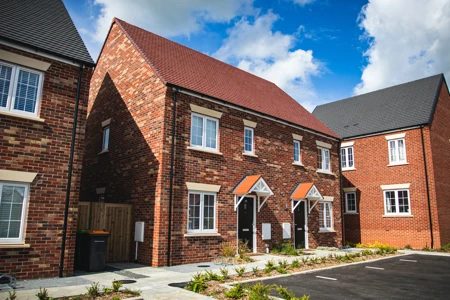Choosing the home you want can be a tough decision, given the sheer variety of houses on the market. The great thing about a new build home, though, is that you can tailor it to your taste, since you put your deposit down on the house whilst it’s in the process of being built, or before the building has even begun!
Now, getting a mortgage for a new build isn’t too different from getting a mortgage on an older house, but there are some things that you should be aware of. That’s why we’ve put together this article to go over how a mortgage works for a new build, the advantages and disadvantages of owning a new build property, and a whistle-stop tour of some of the housing schemes available, so that you’re all clued up before you buy the home of your dreams!
What is a new build?
Although the definition may vary depending on who you speak to, the standard definition of a ‘new build’ is a property or home that hasn’t been lived in before. These can include properties that you buy ‘off-plan’ whilst they’re still being built, or newly built houses that have yet to have another owner.
However, it’s worth noting that usually the turnaround time for securing your new build is 28 days after you’ve put down your deposit. This means you only have 28 days to get a mortgage on the house, otherwise it will go back up for sale – and nobody wants that! So, make sure you’ve spoken to a mortgage adviser before viewing your property, to make sure that you’re mortgage ready by the time you’ve secured your dream home!
So, now you know exactly what a new build is, let’s move along our journey and look at the pros and cons of buying a new build home.
Why should I buy a new build home?
Any investment requires considerable thought before diving straight in, so we’ve put together some useful information on what to consider before buying a new build home.
The pros of buying a new build include:
- National House Building Council (NHBC)- with most New Build properties, there is a 10-year protection warranty issued by the NHBC, should there be any major defaults in the building work.
- More energy efficient- new build homes are normally built to be more energy efficient than older houses, meaning you could save money on your monthly gas and electric bills.
- No upward chain- buying a newly built house means that you won’t be involved in the chain process of buying from somebody else. This generally makes the buying process much simpler!
- Your style- since new builds are essentially a blank canvas, you can choose your own fixtures and furnishings so it’ll be tailored to your tastes from the very beginning!
The cons of buying a new build include:
- House prices- new build house prices are normally more expensive than older houses, so are better as a long-term investment due to the high prices. If you buy a new build and sell it after only a few years, you may end up losing money on the property.
- Up-front costs- you may be required to cough up a higher up-front cost due to the pricier nature of new builds. Not only this, but most developers require a reservation fee when asking you to secure your plot. So, make sure you factor these costs into your budget when calculating how much you can afford.
- Building delays- if you do decide to buy your property before it’s even been built, it’s worth considering possible building delays that could mean you don’t get to move into your home on the original date that you’d planned.
What housing schemes are available?
Now we’ve de-briefed you on all things new build, it’s worth taking a quick tour of the government schemes available that could help you secure that home of your dreams!
The three main schemes out there are:
- Help to Buy- this is where the government will loan you 20% of your mortgage if you already have a 5% deposit, so that you’ll only need to borrow 75% from a lender to secure your home.
- Shared Ownership- this where you can buy a share of your home, normally a minimum share of 25%, and then pay rent on the remaining share on the property until you can afford to buy a larger share in the future.
- Deposit Unlock- this is a new government scheme that allows first time buyers and home movers to borrow 95%* of their mortgage off lenders on new build properties under £750,000. This scheme is available across England, Scotland and Wales from participating builders, and is exclusively for new build homes.
So you see, there are options out there to help you on your home-buying journey!
We know all of this can be a lot to take in, so if you do have any questions or want to learn more about how we can help, please get in touch with one of our new build mortgage specialists, who are on hand to help guide you through the process.
Important information
Your home may be repossessed if you do not keep up repayments on your mortgage.
There may be a fee for mortgage advice. The actual amount you pay will depend upon your circumstances. The fee is up to 1%, but a typical fee is £99.

